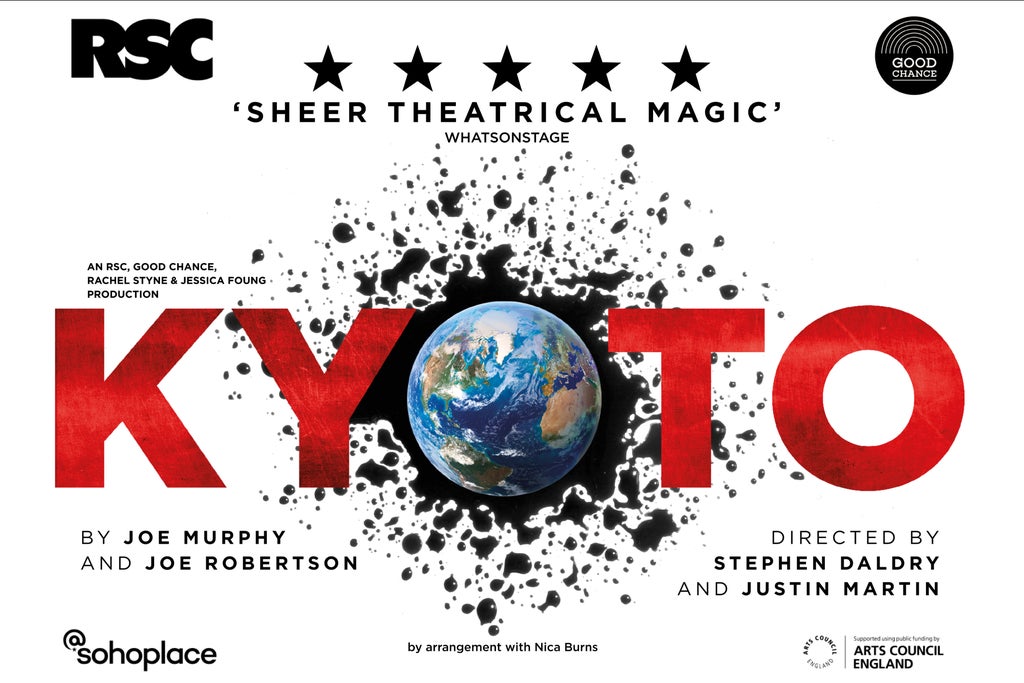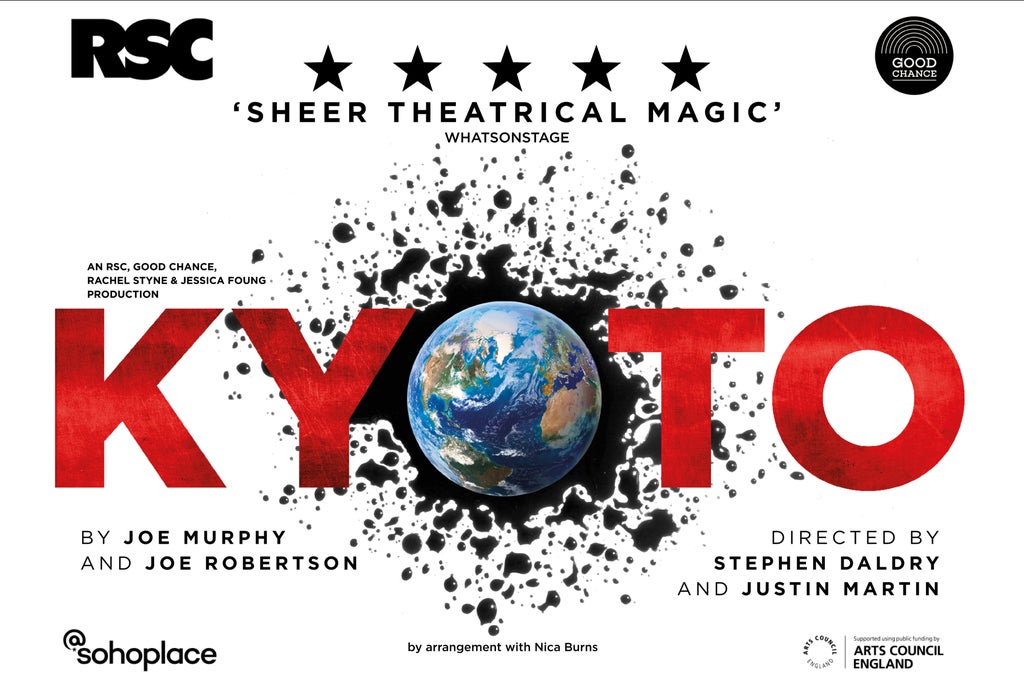Interview: 'It's Been a Dream Project to Figure Out': Actor Stephen Kunken on KYOTO
'We all called it out of the ether together at the same time. And it has felt that way all the way along, like cosmic timing.'
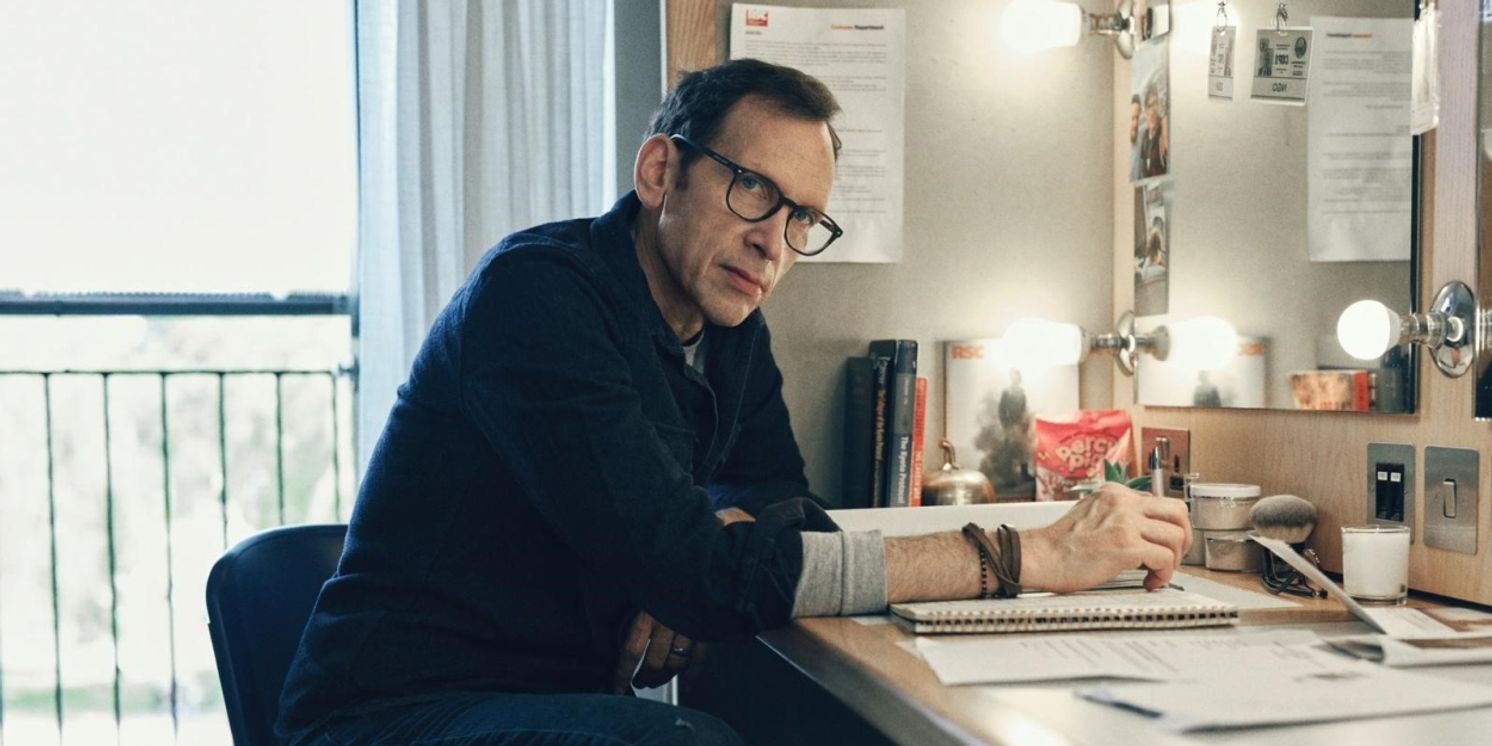
After a run at the RSC in Stratford-upon-Avon, Kyoto has arrived at @sohoplace on the West End. The play, written by Joe Murphy and Joe Robertson and directed by Stephen Daldry and Justin Martin, brings audiences into the world of the Kyoto Conference Centre on 11 December 1997, where nations are struggling to come to an agreement on climate change. In comes Don Pearlman, an American oil lobbyist who becomes the biggest obstacle to reaching such an agreement.
Recently, we had the chance to speak with Stephen Kunken, who plays Don Pearlman. We discussed what it is like to be portraying a character based on a real person, the evolution the show has gone through since it first premiered in Stratford-upon-Avon and how joining Kyoto felt like “cosmic timing.”
How did you first get started in the world of theatre?
I did a lot of it in grammar school and then in high school. I went away from it my first few years of college. I went to Tufts University in Boston, and I didn't intend to go into it. I followed my brother along. He was in improv comedy. I thought that was cool - younger brother syndrome - so I did some improv comedy. And once I started doing improv comedy, a theatre department started to reach out, and they were like, “You should think about auditioning for stuff.” Then it started to dawn on me that I loved it so much that it was a waste to do something else with my life. I just loved it and I was going to give it a shot. I applied to grad school and got into Juilliard, so I went to Juilliard, and have been doing it ever since. There's lots of ups and downs, but the promise of excitement has been paid off many, many times.
And what made you want to be a part of Kyoto?
There's an interesting story to it! I woke up in the middle of the night having a crisis of what I was doing - this was last winter. I turned to my wife and I said, “I’ve been doing a lot of TV and film, and I love TV and film, I've been on a lot of great projects, but I was really missing a thing that encapsulated my whole spirit, and I was wondering if I have missed the boat in some way with the career choice.
The world is in such a state of flux - what does it mean?” I got very heady about it, and she turned to me, she said, “You need to do a play. You haven't done a play in a while.” My wife is a theatre director, and she was like, “You've gotten away from your principal love, which is to be on the stage, and you need something that really means something to you.”
The next day, I called my agent. I said, “Let's open up our aperture a little bit. Let's try to find some play that really speaks to this moment.” And before I could even finish the sentence, he said, “That's really interesting because Stephen Daldry and Justin Martin want to meet you about this play, Kyoto. It's in London. I don't know if you would want it.” And I was like, “Let's read it.” I read it [and] instantly was like, “I have to do this play.”
The next day, I was on a Zoom with Stephen, Justin and the two Joes, and within a few days, we were all committed to each other. Literally, by the end of the Zoom, we all knew that we had to make this thing together - we all were very much on the same page. It was weird because we pulled it between a group of us. I think the Joes and Steven and Justin would feel the same way - that they were sort of looking for something in that moment in their life, and I was looking for the same. We all called it out of the ether together at the same time. And it has felt that way all the way along, like cosmic timing.
For those unfamiliar with the play, could you tell us a little bit about it and the role that you play, Don Pearlman?
Sure! It's an exploration of the time leading up to and including the Kyoto climate conference, which was in 1997. So it starts at the Bush inauguration through the prism of an oil lobbyist named Don Pearlman, who I play, who originally started working in the Reagan administration at the Department of Energy for two terms. As he shifted into the private sector, he was looking for what his next life period would bring and was approached as a lawyer to potentially represent the Seven Sisters, which are basically the giant oil magnets magnates and ended up working for them for many years, trying to make sure that their interests were protected.
He was one of the principal actors trying to make sure that their interests were kept intact - the differing opinions of Americans and American hegemony and the ability to be fiscally sound and to believe in the competition of markets - all of those things, he really fought for tooth and nail. And so it's all of those steps leading up to and then including the Kyoto climate conference in 1997, which was the very first time that the world ever agreed to make any kind of a commitment to targets and timetables and, even in the smallest way, admitting that climate change is a man-made phenomenon.
And what kind of preparation did you do going into this role?
There's a ton of history to go through! And luckily, we had incredible dramaturgs, and the Joes themselves are incredible dramaturgs. They're like reporters - just [a] gigantic wealth of knowledge about the subject. So reading the play in and of itself gave us a roadmap of where to start to look, what kind of research you wanted to do. And then I just started to read as much as I could.
So I read as much of the source materials as I could, and then we got into rehearsal, I was fortunate enough to meet Don's son, Brad, who features in the play. I talked with Brad to begin to fill out who the man was because it was very important to all of us that we weren't just presenting a moustache-twirlling villain, even if that's, in some ways, how he operates in this world. There has to be a point of view here. Otherwise, nothing is learned - those who stand for climate change look like a bunch of fools that couldn't overcome this guy we could all see was a villain.
He is a man of, in his own mind, true integrity. I think in many ways, Don sees himself as the hero in a different book that we're just not all reading. And so I really wanted to fill out who he was as a person, who he was in his family, what he believed in, what his history was.
And then we've been very fortunate because a lot of the people who have been at these COPs [Conference of the Parties] have come and seen the show, and it started to fill in places that we didn't know. John Kerry was at the show the other night, so there's a lot of interest and points of view. It's like Rashomon - you have to take each point of view and factor it into the mosaic. But it's just been a dream project to figure out - it's the existential crisis of our time.
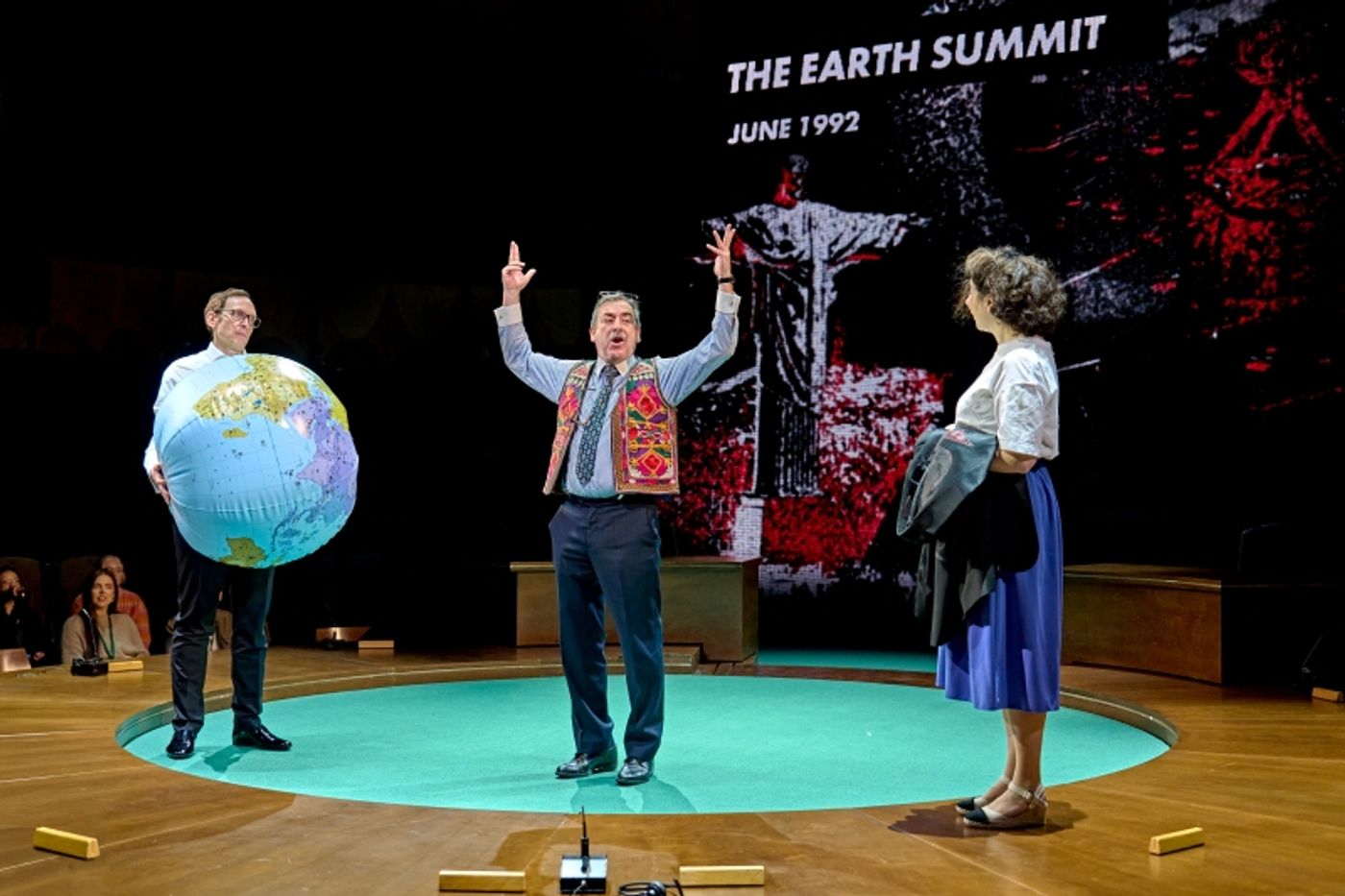
Photo Credit: Manuel Harlan
That's fascinating! Did you have discussions with them after they saw the show?
We had a fascinating night at Stratford where Brad, Don Pearlman’s son, his sister, Stephanie and Shirley, who was married to Don, all came to see the show on the same night where a bunch of people who were fighting directly in opposition, working for the State Departments in the unit for the UN, all came - we all met at The Dirty Duck, the pub in Stratford. And all these people were commingling and it was fascinating to watch!
But they all talked about Don, and each person had a different opinion of him. Some people really respected him for his intelligence and his dogmatic approach to everything. And then some people just couldn't stand him!
What was it like performing the show in Stratford-upon-Avon?
As an American actor, that's one of the places that one must visit if you're an artist, and being on the stage of the Swan was surreal. To be performing just down the street from the church where much of the Shakespeare family is buried was wild. And the audiences are fantastic!
They are open in a way that is very, very exciting. So the audience is incredibly receptive. They don't just disappear into the night when the show is over, because it's a little town, and people mingle - if you go to get your dinner, you see those people, and that community is a bit of an incubator. And so it was a very wonderful place to grow this show.
It's different in London - it takes people a little bit longer to focus because [of] the crazy world and the buses going by. Are they late? Did they have a full day of work and they just arrived? You can feel that energy settle in. But it's magnificent because that same swirl of energy just powers that show through in a different way.
And what has it been like bringing the show to London and coming back to the role?
It's been tremendous! I said to Stephen and Justin at one point that I was really excited to come back because so much of this play lives for all of us. Because it is such a wordy play, it lives in the frontal cortex of our heads. It's one of those experiences in acting, especially because the Joes were constantly changing things, where we were constantly trying to make sure that we got things right.
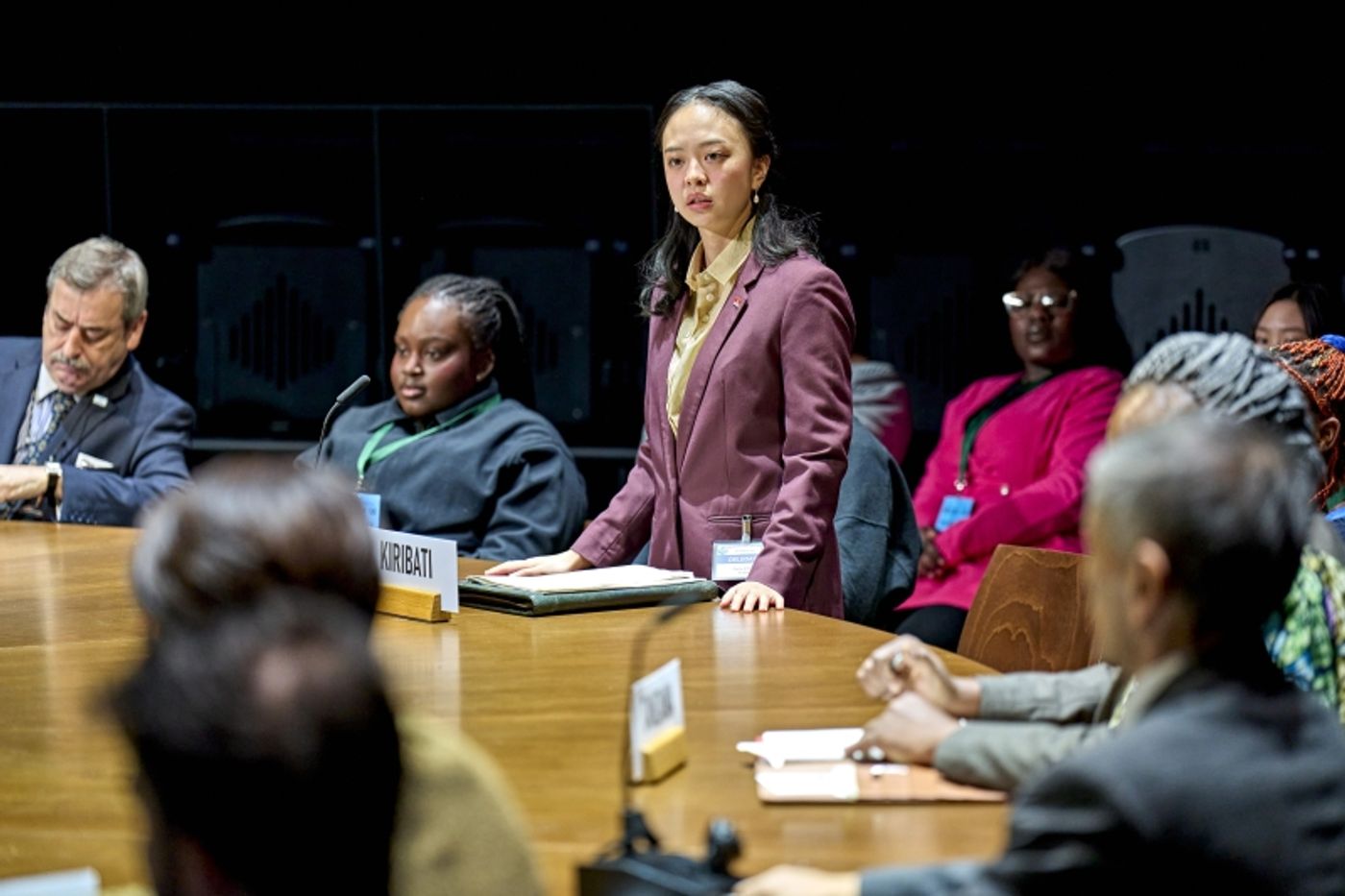
Photo Credit: Manuel Harlan
The other fascinating thing is that the world has changed drastically since we performed at Stratford. We were in a completely different moment. Pre a CEO being shot on the street, pre the LA fires, pre the election. We did this play a few nights ago, and I got an update on my phone that the US was leaving the Paris Climate Accords. So the play is tectonically changing beneath our feet. And you can feel it. The moments that they found hope, they now find irony. Places that they found irony, they now find pain. It's evolving.
It feels ever more important and ever more of a privilege to get to do the show nightly. And it really does flush out why there's a difference between entertainers and artists in these moments. It is a huge privilege to step on stage with this incredible company, who are inspiring artists and try to tackle this and put what we do into some kind of context that we as an audience and as a company can begin to try to digest and figure out a way to move forward.
Some have described the show as semi-immersive as it really brings the audience into the conference. What has that been like performing in that style?
We're in the round Miriam Buether set - it’s fantastic. It places the UN table right in the centre of the theatre. Some people are literally seated at the table! Very much like the Swan, @sohoplace is a wonderful theatre, and you look up to the galleries and they're in front of you - you're in the round, essentially.
And actually, my university theatre was in the round. I think it's the greatest kind of place to play as an actor, because you can't hide. You can't turn upstage and reconnect. You just have to go and act with your back. You have to be in it. There's no proscenium to turn away from - they'll find you everywhere. But it also means that the audience has a very, very strong position in the show - depending on how they respond, that really affects the show in some ways other than the traditional sense.
The audience is part of it. And it's, in some ways, one of the most powerful elements of the show, because we own climate change. We all own why we're here to a certain extent, and we all can own how we move past this moment. But it will take all of us. And so we're all at that table.
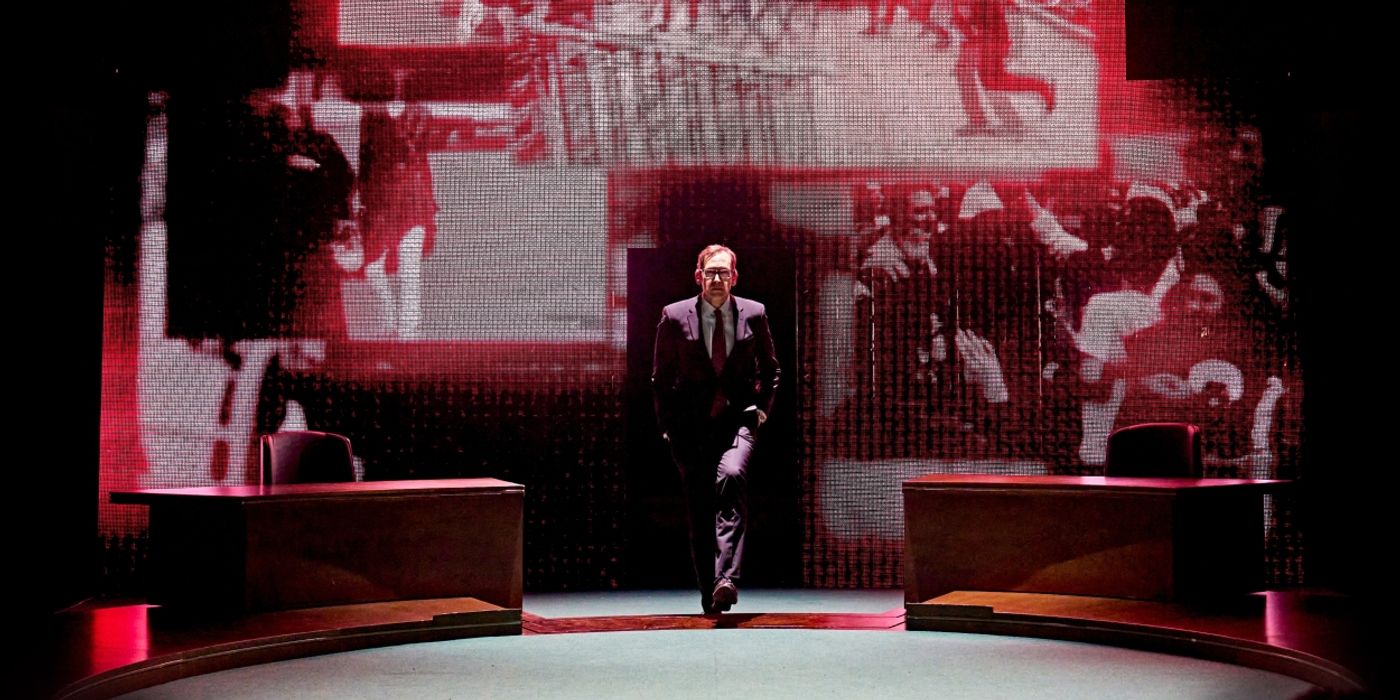
On that note, what do you hope audiences take away from Kyoto?
It's interesting because I think everybody wants an answer. People are like, “Well, it didn't push far enough to tell us why or how.” If we had that, we'd be running the world, right? We'd be doing it. This play, for me, where it is most successful, is the idea of agreement - that agreement isn't binary. You don't win and I lose. It's not a zero-sum game. We all have to make a change. You have to lose something and gain something and have empathy.
At the end of the day, the Kyoto climate conference ended up not making sense. It wasn't ratified by the US afterwards - there were big problems with it. Many COPs down the line, they're still trying to fix things. Reword, put in new commas, try to fix emissions, all of those things. But Raúl Estrada-Oyuela, who's another character in the play, the chairman of the Kyoto climate conference, has a wonderful line in the play where he says, “No one's going to remember what we did here. They're just going to remember if we did it or if we didn't.” And that's 100% true. Kyoto was a success because something got done. People made a commitment to something, and it's extraordinary watching people experience a bunch of people who've just been fighting an entire play, make a change.
And as wily and seductive as Don Pearlman can be, he can't beat the human heart of empathy if we choose to embrace it, and that is what I hope people take away from the play.
And finally, how would you describe Kyoto in one word?
Rollercoaster, but that just describes the mechanism. I'm having trouble sort of synthesising all of my ideas on it - the play is about so many things!
Read our review of Kyoto @sohoplace here.
Kyoto runs until 3 May at @sohoplace.
Main Photo Credit: Richard Agudelo


